If you have interests similar to mine, you will probably enjoy the following books.
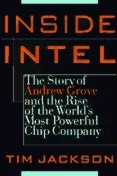
|
Inside Intel - Andy Grove and the Rise of the World's Most Powerful Chip Company
ISBN: 0-525-94141-X |
Inside Intel is the gripping business saga of a company that rose to dominance through technological innovation and maintained its leadership through aggresssive marketing, tough business tactics, and the liberal use of legal firepower. At the center of this fascinating story is Andy Grove, Intel's high-profile CEO and chairman, once a penniless immigrant who waited tables to put himself through college. Drawing on court records, previously unpublished documents, and over a hundred interviews with important figures from Intel's history, Inside Intel is a meticulously researched behind-the-scenes look at this computer giant's brilliant successes, spectacular failures, and incredible inventions and groundbreaking products. It is also a personal saga of the powerful human emotions behind the struggles that have made Intel one of the most competitive players in a high-stakes game of money, power, and ambition.
|
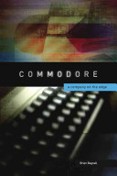
|
Commodore - A Company on the Edge
ISBN: 978-0-9738649-6-0 |
Filled with first-hand accounts of ambition, greed, and inspired engineering, this history of the personal computer revolution takes readers inside the cutthroat world of Commodore. Before Apple, IBM, or Dell, Commodore was the first computer manufacturer to market its machines to the public, selling an estimated 22 million Commodore 64s. Those halcyon days were tumultuous, however, owing to the expectations and unsparing tactics of founder Jack Tramiel. Engineers and managers with the company between 1976 and 1994 share their memories of the groundbreaking moments, soaring business highs, and stunning employee turnover that came with being on top in the early days of the PC world. This updated second edition includes additional interviews and first-hand material from major Commodore figures like marketing guru Kit Spencer, chip designer Bill Mensch, Commodore cofounder Manfred Kapp, and infamous CEO and President Jack Tramiel.
|

|
The Soul of a New Machine
ISBN: 978-0-316-49197-6 |
With the touch of an expert thriller writer, Tracy Kidder recounts the feverish efforts of a team of Data General researchers to create a new 32-bit superminicomputer. A compelling account of individual sacrifice and human ingenuity, The Soul of a New Machine endures as the classic chronicle of the computer age and the masterminds behind its technological advances.
|
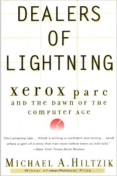
|
Dealers of Lightning: Xerox Parc and the Dawn of the Computer Age
ISBN: 0-88730-989-5 |
During a period of mind-blowing frenzy in the 1970s and '80s, a group of computer eccentrics thrown together by Xerox at a facility in Palo Alto, California, nicknamed PARC, created such monumental innovations as the first personal computer, the graphical user interface, and one of the main precursors to the Internet - yet were resented by their Xerox bosses for "fooling around". Told that none of their inventions would ever amount to anything, many of the original PARC members went on to make millions on the very same ideas Xerox renounced. Focusing on this mythologized group whose genius propelled it to the cutting edge of technohistory, as well as the corporate machinations that kept it from achieving greatness, Dealers of Lightning offers an exclusive, inside glimpse of business history that marks the dawn of the computer age and provides a prism through which to view the 21st century.
|
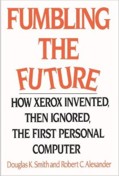
|
Fumbling the Future - How Xerox Invented, Then Ignored, The First Personal Computer
ISBN: 1-58348-266-0 |
Fumbling the Future tells how one of America's leading corporations invented the technology for one of the fastest-growing products of recent times, then miscalculated and mishandled the opportunity to fully exploit it. It is a classic story of how innovation can fare within large corporate structures, the real-life odyssey of what can happen to an idea as it travels from inspiration to implementation. More than anything, Fumbling the Future is a tale of human beings whose talents, hopes, fears, habits, and prejudices determine the fate of our largest organizations and of our best ideas.
|

|
iWoz - The Autobiography of the Man Who Started the Computer Revolution
ISBN: 978-0-7553-1408-9 |
iWoz offers readers a unique glimpse into the offbeat and brilliant but ethical mind that conceived the Macintosh. After 25 years avoiding the public eye, Steve Wozniak reveals the full story of the Apple computer, from its conception to his views on the iconic cult status it has achieved today. In June 1975 Steve's curiosity and determination inspired him to build a computer, the first Apple. Six months later, he sold the machine, and for the self-professed 'engineer's engineer', success was imminent. But this story is full of life lessons, critical decisions, huge triumphs and big mistakes. Steve speaks also of his childhood, phone hacking pranks, working at Hewlett-Packard, the life-changing plane crash and teaching.
|

|
Hackers: Heroes of the Computer Revolution - 25th Anniversary Edition
ISBN: 978-1-4493-8839-3 |
This 25th anniversary edition of Steven Levy's classic book traces the exploits of the computer revolution's original hackers - those brilliant and eccentric nerds from the late 1950s through the early '80s who took risks, bent the rules, and pushed the world in a radical new direction. With updated material from noteworthy hackers such as Bill Gates, Mark Zuckerberg, Richard Stallman, and Steve Wozniak, Hackers is a fascinating story that begins in early computer research labs and leads to the first home computers.
Levy profiles the imaginative brainiacs who found clever and unorthodox solutions to computer engineering problems. They had a shared sense of values, known as "the hacker ethic", that still thrives today. Hackers captures a seminal period in recent history when underground activities blazed a trail for today's digital world, from MIT students finagling access to clunky computer-card machines to the DIY culture that spawned the Altair and the Apple II.
|

|
Where Wizards Stay Up Late: The Origins of the Internet
ISBN: 978-0-6848-3267-8 |
Twenty five years ago, it didn't exist. Today, twenty million people worldwide are surfing the Net. "Where Wizards Stay Up Late" is the exciting story of the pioneers responsible for creating the most talked about, most influential, and most far-reaching communications breakthrough since the invention of the telephone.
In the 1960's, when computers where regarded as mere giant calculators, J.C.R. Licklider at MIT saw them as the ultimate communications devices. With Defense Department funds, he and a band of visionary computer whizzes began work on a nationwide, interlocking network of computers. Taking readers behind the scenes, "Where Wizards Stay Up Late" captures the hard work, genius, and happy accidents of their daring, stunningly successful venture.
|
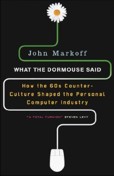
|
What the Dormouse Said: How the Sixties Counterculture Shaped the Personal Computer Industry
ISBN: 978-0-1430-3676-0 |
Most histories of the personal computer industry focus on technology or business. John Markoff's landmark book is about the culture and consciousness behind the first PCs - the culture being counter, and the consciousness expanded, sometimes chemically. It's a brilliant evocation of Stanford, California, in the 1960s and '70s, where a group of visionaries set out to turn computers into a means for freeing minds and information. In these pages one encounters Ken Kesey and the phone hacker Cap'n Crunch, est and LSD, The Whole Earth Catalog and the Homebrew Computer Club. What the Dormouse Said is a poignant, funny, and inspiring book by one of the smartest technology writers around.
|
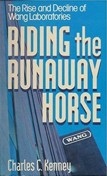
|
Riding the Runaway Horse: The Rise and Decline of Wang Laboratories
ISBN: 0-316-48919-0 |
Riding the Runaway Horse chronicles the American computer company founded in 1951 by Chinese immigrant An Wang, its scientific and financial success, and its collapse in the mid 1980s. Journalist Charles Kenney explains how the initial success blinded the managers to major changes in the industry. |










